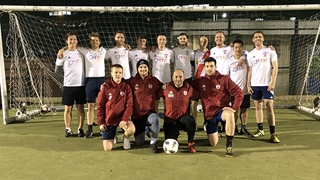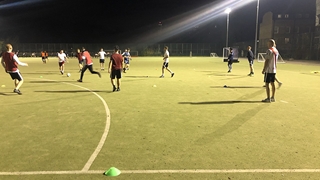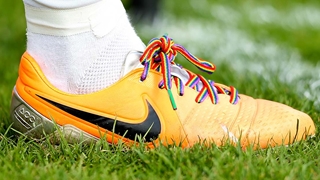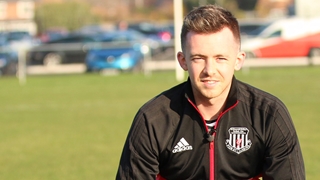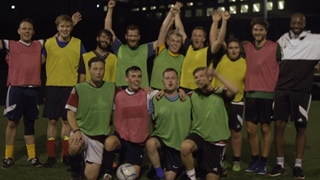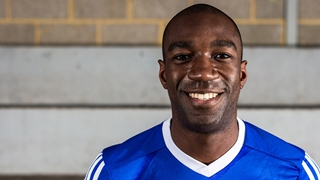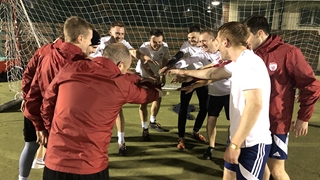
London Falcons are one of the capital’s oldest inclusive football teams.
Founded in 2006, their aim is to give gay and bisexual men a safe space to play football without the fear of discrimination.
“We're proud to be an inclusive team,” says chairman Will Oster. “There's 26 players in our current squad. We play our home games at Tooting Park Common and train at Kennington Park every Tuesday night.
“Originally, we targeted gay and bisexual men, but there are now heterosexual players too. Our environment is safe, enjoyable and competitive.
“Prior to joining London Falcons, I struggled playing at other clubs. There wasn’t necessarily any overt homophobia, but there was certainly the odd comment here and there and that’s all it can take to affect you.”
“Until I discovered London Falcons, I felt quite awkward playing football,” adds Rob Nguyen, who joined the Falcons in 2017.
“I kind of fell out of love with the game and slowly stopped playing. This was partly down to casual homophobic slurs.
“I'm pretty good at football, but I felt incapable of showing what I could do with the ball until I came to London Falcons. Now I can play with a smile on my face and with like-minded people, too.”
London Falcons currently compete in the Wimbledon and District Football League and have made a promising start to the season, winning seven of their opening nine matches.
Their primary colours are red and white, but the next few games will have a slightly different look and feel as the club support the 2019 Rainbow Laces campaign, which runs from Friday 22 November until Sunday 8 December.
Many grassroots and professional teams across the UK will wear rainbow-coloured laces – and some will even adopt ‘rainbow’ corner flags – to show their support for the LGBT+ community.
“Rainbow Laces is a really important campaign,” says London Falcons captain George Coe.
“It not only promotes inclusion but provides education. We have to develop a culture where, from a young age, everyone understands homophobia is wrong. If you wouldn’t say something offensive on the street then it’s not OK, under any circumstances, to say it on a football pitch or inside a stadium.
“Getting to this point will help change the culture of football, and perhaps even encourage players to come out who can then become role models to the LBGT+ community.
“We still don’t have an openly gay male professional footballer playing in England. Of course, no one should ever feel forced to come out, but Rainbow Laces is a chance to celebrate the LGBT+ community and make everyone in, or connected to it, feel comfortable and welcomed by football.”
Thankfully, most of London Falcons players haven’t encountered homophobic abuse during their time with the club, but that wasn’t always the case. Liverpool fan Nguyen suffered bullying at school after he came out.
“Growing up in quite a tough part of south London, I was quite popular – at least until people found out I was gay,” he says. “That’s when I discovered who my real friends were. I was bullied due to my sexuality and even had teachers trying to tell my parents before I was ready.
“Coming out is a tough process to go through. My parents, who were born in Vietnam, are still not entirely comfortable with it. I don’t want to make out like, ‘Oh woe is me’ because I've a lot to be thankful for today, but I did go through some dark times.
"Playing for London Falcons offered me a shared team experience on and off the pitch. Having like-minded people to talk to gives me a chance to improve my mental health as well as my football skills.
“A lot of the LGBT+ community blend in, especially playing or watching football. That’s how it should be because we are all united by football. But then suddenly you want to celebrate a goal with your boyfriend or you hear a throwaway homophobic remark and you become uncomfortable. That’s what we are trying to change.
“Often it’s the little things that help – an LGBT+ supporters group, a message of support from a high-profile player or, for some, just better facilities.
"For example, I also play for another team and we have a transgender player on it. It’s hard for her. She struggles in changing rooms, or football stadiums, because there aren’t always gender-neutral toilets. It’s small changes that are simple to execute and promote acceptance that make a massive difference.”
The FA are committed to creating an inclusive environment for the LGBT+ community to both play and watch football. We're working with organisations, like LGBT+ charity Stonewall who founded Rainbow Laces, to achieve this goal.
We believe one way to prevent homophobia within or around football stadia is to encourage those who witness it to report it.
That’s precisely what Wycombe Wanderers goalkeeper Ryan Allsop did after he received homophobic abuse from a fan during his side’s 2-0 victory at Tranmere earlier this month. It led to the supporter in question, who hasn’t yet been named, being arrested.
“You can take positives out of the arrest,” added London Falcons striker Edward Strudwick, who joined the club after discovering it via Google.
“No one wants to hear abuse of any kind from the stands, but the arrest at least shows reporting rather than ‘ignoring’ leads to some form of justice.
“In the heated environment of a football ground it’s hard to just call someone out on the spot. Those who do so are very brave, but others who don’t want to risk a confrontation need to have another option.
"That’s why it’s reassuring The FA have reporting procedures in place, while Rainbow Laces can be used to remind people of how best to deal with situations if they arise.”
“As a gay man, it was certainly disappointing to see what happened in the Tranmere-Wycombe game,” adds Oster. “Perhaps we are all guilty, at times, of ignoring discrimination or pretending it doesn’t exist.
“At London Falcons we are fortunate because we've never had anything to report, but we must use Rainbow Laces to support anyone in the LGBT+ community who doesn’t feel part of the football family and show them they can take action to change that if they do receive abuse.”
“I think the process to report discrimination has improved,” says London Falcons secretary Matt Hall, who joined the club as a goalkeeper in 2017 after moving south from Manchester. “We are in a better place than even a few years ago.
“Before joining London Falcons, I was manager of an LBGT+ team called Village Manchester. We had this one game where the whole team received homophobic abuse. We complained to the referee then reported it, but that process was painfully slow.
“Referees at grassroots level need clear guidance on how to deal with such incidents and it’s hard because without the glare of cameras, media or even at times witnesses, where is their incentive to get involved? That’s why I am personally in favour of just walking off as a last resort.
“The FA know they must support officials and County FAs. The grassroots game needs adequate resources to deal with all types of discrimination. That way, those guilty of abuse will stop thinking they can just get away with it and end up being punished.
"And, as importantly, we will start educating to prevent the abuse in the first place rather than constantly having to react to it.”
Rainbow Laces is not only a means to show LGBT+ support and pride. The campaign is also about ensuring, in a more practical sense, that football is a safe space for LGBT+ community to play or watch games.


